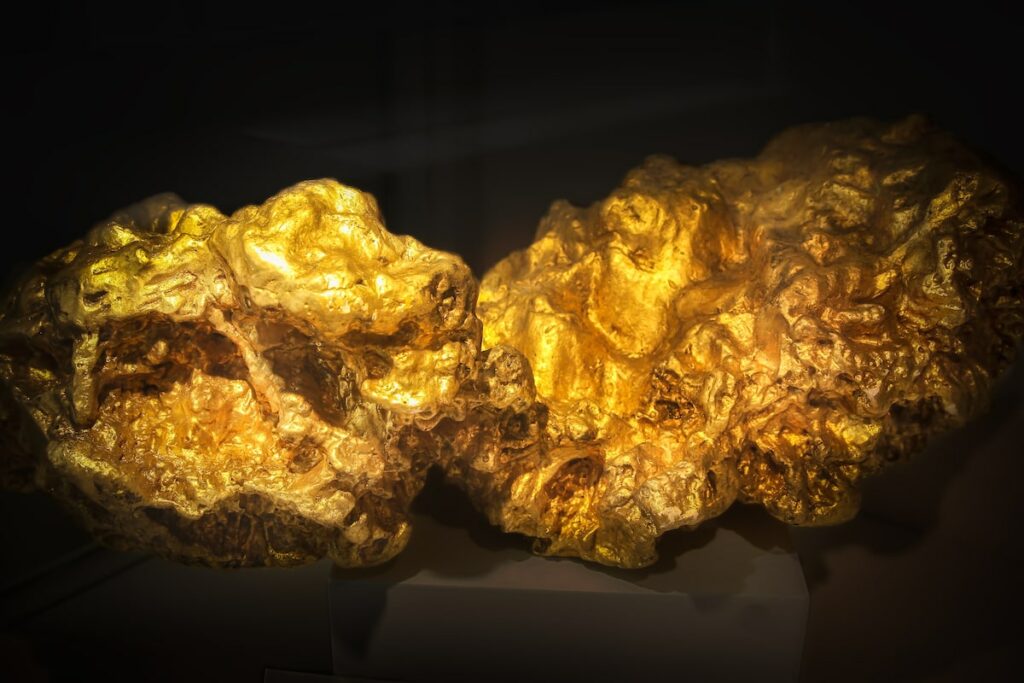We’ve all been there – it’s a hot summer day, and you throw on some swimwear and dive into the pool to cool off, only to notice you forgot to take off your gold jewelry.
The uncertainty sets in, and you begin wondering if you will damage your precious gold.
You can get gold wet as long as it’s pure gold. However, it may begin to fade after some time. Gold with a higher quantity of other metals is particularly susceptible to fading, but the gold itself cannot be damaged or destroyed by water.
In this article, I’ll go into more detail about whether or not you can get gold wet.
I’ll also discuss if you can swim with gold, take a shower wearing it, and if gold can tarnish.
Let’s get started!
Can You Get Carat Gold Wet?
Gold jewelry comes in various grades, and the number of carats indicates its purity.
The purest gold is rated at 24 carats (ct,) and this value drops as higher percentages of metal are alloyed with it.
The likelihood of carat gold tarnishing or fading when it gets wet depends entirely on its purity.
You can get carat gold wet, and 24-carat gold is entirely water resistant. However, as the purity (carat number) drops, it’s more likely that the gold will tarnish if it’s repeatedly exposed to water.
In the Golden Age of Piracy, when valuables were transported across the sea and pirates were a serious threat to maritime operations, many ships were sunk carrying a cargo of gold.
In those times, a sunken ship was lost forever, but in the modern era, divers occasionally come across gold that has been at the bottom of the ocean for hundreds of years with little evidence of tarnishing or damage.
Will My Carat Gold Lose Its Shine?
The likelihood of your carat gold losing its shine depends on its purity.
| Carat Rating | Gold Percentage | Water Damage Potential |
| 24 | 100% | None |
| 18 | 75% | Low |
| 14 | 58.3% | High |
| 10 | 41.7% | Very high |
| 9 | 37.5% | Extreme |
| Plated | N/A | Can destroy plating |
| Gold Plated Silver | N/A | Can destroy plating |
It won’t typically tarnish from occasional water exposure, but you can refer to the table above to get an idea of how water-resistant your carat gold is.
Can You Swim With Gold?
Swimming with gold carries some hidden risks. The water could contain high levels of salt or chlorine, depending on where you swim.
You can swim with gold, but lower-carat gold may fade faster, especially if the water has chemicals, such as chlorine, in it. If you’re swimming in the ocean, the salt can also fade it.
Below I’ll discuss various swimming locations and the risks associated with them if you swim wearing gold jewelry:
Swimming in a Chlorinated Pool Wearing Gold Jewelry
Most pools contain chlorine. While this isn’t a problem for 24-carat gold, it can damage lower gold grades much faster than pure water.
Chlorine reacts quickly with alloy metals in gold below 24 carats, so you should always take your jewelry off when swimming in chlorinated water.
Swimming in a Freshwater Lake Wearing Gold Jewelry
Taking a dip in a lake is a great way to cool off in summer, and you may not want to remove your gold for fear of losing it.
You might also think your gold is safe since freshwater lakes don’t have chlorine and minimal salt.
You shouldn’t swim in a lake wearing gold jewelry because the cold water can cause your fingers to shrink, making it more likely that your gold ring will slip off.
If the water’s deep, it will be difficult or near impossible to retrieve your gold jewelry if this happens.
Even in shallow lake water, the bottom of the lake will likely be muddy and possibly even covered in water plants.
While the water is generally chemical- and salt-free, the risk of losing gold jewelry in a lake cannot be understated.
Swimming in the Ocean Wearing Gold Jewelry
The saltwater in the ocean can fade gold jewelry with lower purity levels.
However, the gold would need constant exposure to saltwater to show significant fading, and taking one dip in the sea shouldn’t damage it.
If you plan on swimming in the ocean wearing your gold jewelry, ensure that the clasp functions correctly and won’t accidentally cause the piece to come loose.
Can You Take a Shower Wearing Gold?
Showering with gold occasionally shouldn’t damage it, but this depends on the metal’s purity. Lower-carat gold is more likely to dull in the shower due to the alloy metals.
You can take a shower wearing gold, but the soapy water may cause lower-carat gold to fade faster or look dull. If you shower wearing gold jewelry, you’ll need to polish and buff it more frequently.
Showering with a gold ring is risky because the soap is slippery and might cause it to fall off your finger. Wearing a gold chain or bracelet is less risky.
You can safely shower with 24-karat gold jewelry because it’s completely water resistant.
However, if your gold has lower purity, you should avoid showering when wearing jewelry because it may tarnish and fade more rapidly.
Will Gold Tarnish?
Gold is a valuable investment, and keeping it in pristine condition is a good idea. Many people wonder if gold tarnishes and if they need to polish it to keep it in top shape.
Gold doesn’t tarnish. However, lower-carat gold with higher quantities of alloy metals is susceptible to tarnishing.
If your gold is of lower purity, like 9- and 10-carat gold, be sure to remove it when you want to get wet.
More specifically, tarnishing is caused by the oxidation of alloy metals. It may happen naturally over a long time, but introducing chemicals into the mix rapidly accelerates the oxidation process.
Bleach Can Destroy Gold
Be careful about wearing gold if you use chemicals like bleach around the house. Neat or strong bleach solutions can rapidly tarnish and damage gold-filled jewelry.
Most gold jewelry is alloyed because pure gold is quite soft and can be deformed with relatively little force. The alloy metals, in particular, are susceptible to being damaged by bleach through a chemical reaction.
Can You Wear Gold Every Day?
If you own gold jewelry, it’s probably one of your prized possessions, and you’ll want to wear it as often as possible. Can you wear gold every day?
You can wear gold every day, especially if you have 24-carat gold jewelry.
However, if you plan on doing a lot of physical labor or work with chemicals, consider removing it first so that you don’t damage or lose it.
If your gold has a lower purity, you can still wear it daily, but it will likely fade and tarnish faster due to constant exposure to sweat, perfumes, rain, and other moisture. In such cases, you’ll need to polish it more often.
Water cannot damage or tarnish pure gold, but since gold jewelry often contains other metals like copper and silver, you should always err on the side of caution and remove your jewelry to avoid getting it wet.
If you shower wearing gold jewelry, you’ll need to polish and buff it more frequently.
Check out the other guides on our site for more:




